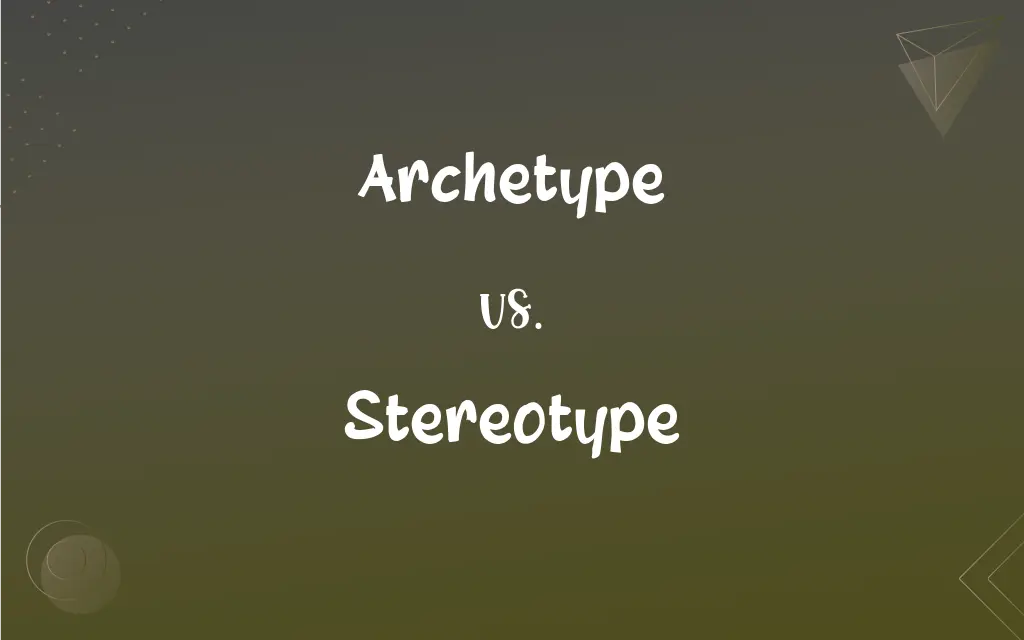Archetype vs. Stereotype: What's the Difference?
Edited by Aimie Carlson || By Janet White || Published on December 22, 2023
Archetype is a universally recognized symbol or character representing a fundamental human experience. Stereotype is an oversimplified, generalized belief about a particular group or type of person.

Key Differences
An archetype is a typical example of a certain person or thing, often embodying universal patterns of human nature. It represents fundamental human motifs that evolve over time, appearing in literature, art, and mythology. In contrast, a stereotype is a fixed, overgeneralized belief about a particular group of people or type of person. It often arises from societal beliefs and cultural norms, leading to misconceptions and bias about others.
Archetypes function as a prism through which the complexities of human experiences are reflected and understood in a broader context. They are foundational elements in storytelling, creating deep connections with audiences across different cultures. Stereotypes, on the other hand, limit understanding by reducing individuals to simplistic traits, often based on misconceptions or prejudiced viewpoints.
Archetypes are not restricted by time, culture, or societal changes; they remain constant in their symbolic meaning and representation. For example, the "hero" archetype represents bravery and sacrifice across various cultures. Stereotypes, conversely, can evolve or diminish over time and are often tied to contemporary social attitudes and prejudices.
The value of archetypes lies in their ability to inspire and provoke thought, often leading to a deeper understanding of the human psyche. Stereotypes, however, can be harmful, perpetuating negative or simplistic views and preventing genuine understanding of individuals or groups.
Archetypes tap into universal truths and shared experiences, while stereotypes tend to oversimplify and marginalize, often based on limited or biased information.
ADVERTISEMENT
Comparison Chart
Definition
Universal symbol in human culture
Oversimplified belief about a group
Function
Represents deep human experiences
Reduces complexity to simplicity
Cultural Influence
Timeless, cross-cultural
Tied to specific cultures/times
Impact on Perception
Broadens understanding
Narrows and biases perception
Role in Literature/Art
Adds depth and universality
Often perpetuates clichés
ADVERTISEMENT
Archetype and Stereotype Definitions
Archetype
An original model after which other similar things are patterned.
Hercules is an archetype of a hero in mythology.
Stereotype
A widely held but oversimplified image or idea of a particular type of person or thing.
The stereotype of the absent-minded professor portrays intellectuals as forgetful.
Archetype
A recurrent symbol in literature, art, or mythology.
The wise old man in fairy tales is a classic archetype.
Stereotype
A standardized mental picture that is held in common by many and represents an oversimplified opinion or prejudiced attitude.
The stereotype of the lazy teenager is a common misconception.
Archetype
A typical example of certain person or thing in literature.
The innocent youth is a common archetype in coming-of-age stories.
Stereotype
A simplified and standardized conception or image invested with special meaning and held in common by members of a group.
The stereotype that all politicians are dishonest can affect public opinion.
Archetype
An inherited pattern of thought or symbolic imagery derived from past collective experience.
The mother figure archetype often symbolizes nurturing and protection.
Stereotype
An idea that is used to describe a particular group of people and that may often be untrue or only partly true.
The stereotype of the starving artist oversimplifies the lives of creative individuals.
Archetype
A character, action, or situation that represents universal patterns of human nature.
The quest archetype is seen in many epic narratives.
Stereotype
A fixed, generalized belief about a particular group or class of people.
The stereotype of the rich and snobbish is often used in movies.
Archetype
An original model or type after which other similar things are patterned; a prototype
"'Frankenstein' ... 'Dracula' ... 'Dr. Jekyll and Mr. Hyde' ... the archetypes that have influenced all subsequent horror stories" (New York Times).
Stereotype
A conventional, formulaic, and oversimplified conception, opinion, or image.
Archetype
An ideal example of a type; quintessence
An archetype of the successful entrepreneur.
Stereotype
One that is regarded as embodying or conforming to a set image or type.
Archetype
In Jungian psychology, an inherited pattern of thought or symbolic imagery derived from past collective experience and present in the individual unconscious.
Archetype
An original model of which all other similar concepts, objects, or persons are merely copied, derivative, emulated, or patterned; a prototype.
Archetype
An ideal example of something; a quintessence.
Archetype
(literature) A character, object, or story that is based on a known character, object, or story.
Archetype
(psychology) According to Swiss psychologist Carl Jung: a universal pattern of thought, present in an individual's unconscious, inherited from the past collective experience of humanity.
Archetype
(textual criticism) A original manuscript of a text from which all further copies derive.
Archetype
To depict as, model using, or otherwise associate an object or subject with an archetype.
Archetype
The original pattern or model of a work; or the model from which a thing is made or formed.
The House of Commons, the archetype of all the representative assemblies which now meet.
Types and shadows of that glorious archetype that was to come into the world.
Archetype
The standard weight or coin by which others are adjusted.
Archetype
The plan or fundamental structure on which a natural group of animals or plants or their systems of organs are assumed to have been constructed; as, the vertebrate archetype.
Archetype
An original model on which something is patterned
FAQs
Can stereotypes ever be positive?
While some stereotypes might seem positive, they still oversimplify and can lead to misunderstandings.
What is a stereotype?
A stereotype is an oversimplified, generalized belief about a particular group or type of person.
Are archetypes culturally specific?
Archetypes are not culturally specific; they are universal and found in various cultures.
Can stereotypes be harmful?
Yes, stereotypes can be harmful as they promote oversimplified and often prejudiced views about people.
Are stereotypes based on truth?
Stereotypes may have a grain of truth but are mostly oversimplified and not fully accurate.
Can archetypes be negative?
While archetypes themselves are neutral, they can be portrayed in negative contexts depending on the story.
How do archetypes differ from stereotypes in literature?
Archetypes in literature represent universal human experiences, while stereotypes are oversimplified characterizations of groups.
Do stereotypes change over time?
Yes, stereotypes can change as societal attitudes and beliefs evolve.
Is the "mother figure" an archetype?
Yes, the mother figure is an archetype symbolizing nurturing and protection.
Can anyone be a stereotype?
Stereotypes can be applied to any group but are generally unrepresentative and oversimplified.
What is an archetype?
An archetype is a universally recognized symbol or character that embodies a fundamental human experience.
What is an example of a common archetype in mythology?
The "hero" is a common archetype in many mythologies, symbolizing bravery and adventure.
Why are archetypes important in storytelling?
Archetypes connect stories to universal human experiences, making them more relatable and profound.
Are all stereotypes negative?
While not all stereotypes are negative, they are all limiting and fail to capture individual uniqueness.
Is the "trickster" an archetype?
Yes, the trickster is an archetype, often representing deception and wisdom.
Why are stereotypes considered shallow?
Stereotypes are considered shallow because they lack depth and understanding, reducing complex individuals to simple traits.
What role do archetypes play in psychology?
In psychology, archetypes represent fundamental human motifs and patterns in the collective unconscious.
How do stereotypes affect society?
Stereotypes can lead to prejudice and discrimination, affecting how groups are viewed and treated.
What's the difference between a cliché and a stereotype?
A cliché is an overused expression or idea, while a stereotype is an oversimplified belief about a group.
Can archetypes evolve over time?
The core meaning of archetypes remains constant, but their expressions can evolve culturally.
About Author
Written by
Janet WhiteJanet White has been an esteemed writer and blogger for Difference Wiki. Holding a Master's degree in Science and Medical Journalism from the prestigious Boston University, she has consistently demonstrated her expertise and passion for her field. When she's not immersed in her work, Janet relishes her time exercising, delving into a good book, and cherishing moments with friends and family.
Edited by
Aimie CarlsonAimie Carlson, holding a master's degree in English literature, is a fervent English language enthusiast. She lends her writing talents to Difference Wiki, a prominent website that specializes in comparisons, offering readers insightful analyses that both captivate and inform.






































































